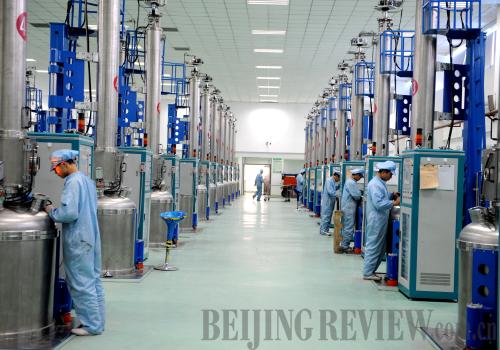|
 |
|
SOLAR BOOM: Workers produce silicon rods used on solar panels in Shanxi Jingdu Solar Energy Co. Ltd. (YAN YAN) |
The intense luminosity emanating from China's solar panel industry may be fading. In less than one year, the industry nearly collapsed from its prominent position as a new energy source.
Data provided by China Nonferrous Metal Industry Association showed the price for domestic-made silicon wafers, a major component of solar cells, plummeted by 52 percent.
"I had to stop production because of the price plunge," said Zhou Jianming, owner of Zhejiang Mingfeng Electronic Technology Co. Ltd.
Problems at home and abroad have hindered the industry's growth. Demand from Europe, China's major solar cell market, decreased as a result of lowered subsidies for solar energy. Seven American makers of solar panels also filed a broad trade case in Washington against the Chinese solar industry in October. Meanwhile, blind expansion has brought serious overcapacity of the domestic solar panel industry.
China's photovoltaic industry will be going through a reshuffle in the next three to five years, said Li Junfeng, Deputy Director of the Energy Research Institute under the National Development and Reform Commission (NDRC).
U.S. solar panel makers have accused their Chinese counterparts of using billions of dollars in government subsidies to help gain sales in the American market. They also accused China of dumping solar panels in the United States.
"If the filing turn out to be successful, the door to the U.S. market for Chinese photovoltaic enterprises will be completely shut," Li said.
China's Suntech Power Holdings Co. Ltd., the world's largest maker of solar panels, based in Wuxi, Jiangsu Province, said in a statement, "Each individual company, including Suntech, will respond in accordance with International Trade Commission & Department of Commerce guidelines. As a global company listed on the NYSE, we are confident in our position and well-prepared to substantiate our strict adherence to fair international trade practices."
Yingli Green Energy Holding Co. Ltd., based in Baoding in north China's Hebei Province, said it was reviewing a trade complaint filed by U.S. solar panel makers against Chinese rivals and plans to mount a vigorous defense.
"We would like to remind everyone that these petitions obviously present only the views of one side, and only a partial view of a very complicated story," Yingli said.
Despite the fact that the U.S. market only accounts for approximately 10 percent of Chinese solar equipment exports, the anti-dumping accusation may soon spread to the EU.
Europe is the biggest export market of China's solar panels, accounting for 70 percent of the total exports in 2010, according to Li.
One of the seven companies who filed anti-dumping and countervailing duty petitions is SolarWorld, the largest U.S. producer of crystalline silicon photovoltaic products. It is actually a Germany-based company.
"If the filing succeeds in the United States, Europe will surely follow. It is terrible for Chinese solar enterprises since the European market makes up a lion's share of Chinese exports," Li said.
But are anti-dumping and anti-subsidy filings real remedies to save the solar industry in the United States?
To limit exports from China will further push up the price of solar energy in the United States and do harm to the new energy plan that the Obama administration vows to boost, said Li.
A senior official with the Bureau of Fair Trade for Imports and Exports of the Ministry of Commerce (MOFCOM) told Xinhua News Agency that China currently registered a deficit of $1.88 billion with the United States in the trade of solar products and the raw materials and equipment in making clean energy products.
The official warned that if the United States slaps punitive tariffs on Chinese exports of solar panels, it would also hurt U.S. exports of raw materials and manufacturing equipment to China.
"If the U.S. Government files a case, adopts duties and sends an inappropriate protectionist signal, it would cast a shadow over world economic recovery," an unnamed official said in a statement posted on the website of MOFCOM.
| 